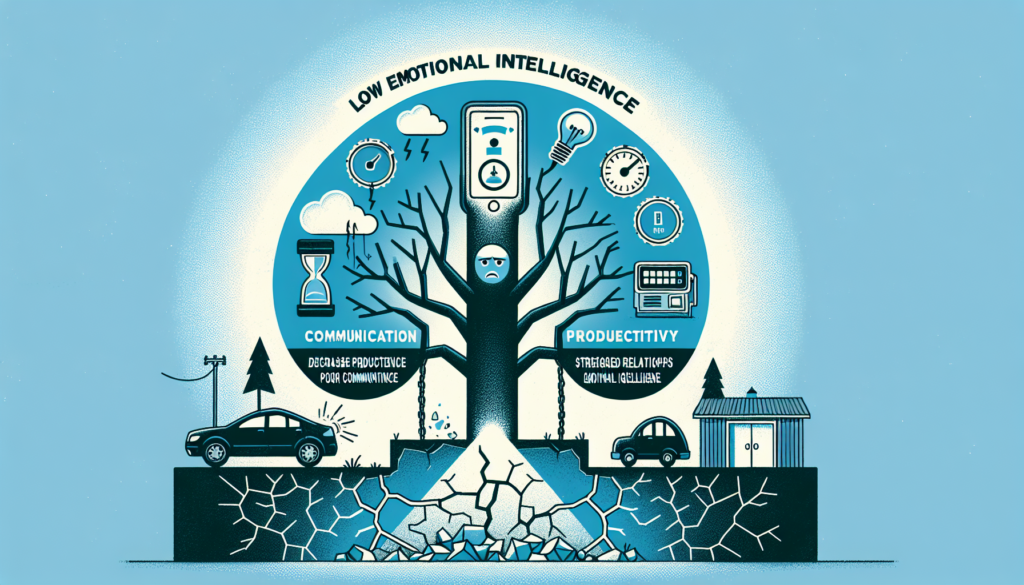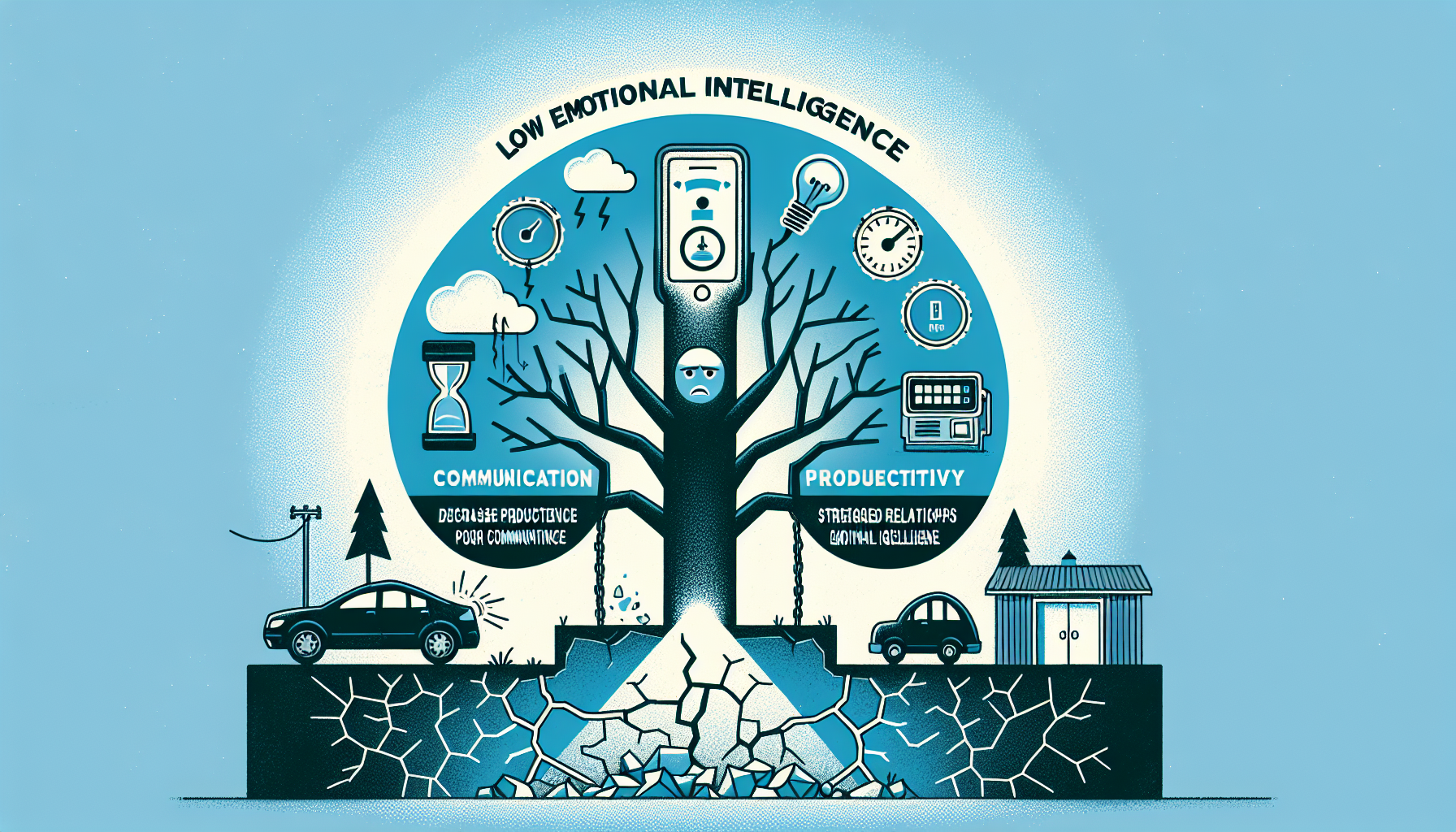In today’s rapidly evolving workplace, emotional intelligence plays a crucial role in determining the dynamics of our interactions and overall success. From innovation and efficiency to job displacement concerns, the impact of emotional intelligence is far-reaching. This article explores the consequences of a lack of emotional intelligence, examining how it can hinder collaboration, impede personal growth, and even instill fear of uncontrollable AI. By understanding the importance of emotional intelligence and the potential risks that come with its absence, individuals can strive to cultivate this key skill, fostering a more harmonious and productive work environment.
Definition of Emotional Intelligence

A. Overview
Emotional intelligence refers to the ability to recognize, understand, and manage one’s emotions effectively, as well as being able to navigate and handle interpersonal relationships successfully. It involves empathy, self-awareness, self-regulation, motivation, and social skills. Emotional intelligence plays a crucial role in personal and professional success, especially in the context of the workplace.
B. Components of Emotional Intelligence
There are several key components of emotional intelligence:
-
Self-Awareness: The ability to recognize and understand one’s own emotions, including strengths and weaknesses.
-
Self-Regulation: The capability to manage and control emotions, impulses, and reactions in various situations.
-
Motivation: The drive to set and achieve goals, as well as the ability to stay positive and resilient in the face of challenges.
-
Empathy: The capacity to understand and relate to others’ emotions, perspectives, and experiences.
-
Social Skills: The aptitude to build and maintain relationships, effectively communicate, and work collaboratively with others.
These components together form the foundation of emotional intelligence and are integral to fostering healthy workplace dynamics.
II. Importance of Emotional Intelligence in the Workplace
A. Enhances Communication
Emotional intelligence plays a vital role in improving communication within the workplace. Individuals with high emotional intelligence are better able to articulate their thoughts and feelings, listen actively, and understand subtle non-verbal cues. This facilitates effective communication, reduces misunderstandings, and promotes a harmonious and productive work environment.
B. Builds Strong Relationships
Strong relationships are essential for the success of any organization. Emotional intelligence enables individuals to empathize with their colleagues, build rapport, and establish trust. This fosters a sense of camaraderie, enhances collaboration, and paves the way for effective teamwork.
C. Fosters Teamwork
Successful teamwork is reliant on individuals who can manage their emotions and work well with others. Emotional intelligence helps team members understand and respect each other’s perspectives, resolve conflicts amicably, and contribute to a positive and supportive team environment. It encourages cooperation, synergy, and the collective achievement of shared goals.
D. Encourages Conflict Resolution
Conflicts are inevitable in any workplace, but emotional intelligence equips individuals with the tools to handle them constructively. Employees with high emotional intelligence can manage conflict in a calm and respectful manner, seeking mutually beneficial resolutions. This minimizes the negative impact of conflicts, promotes a healthy work atmosphere, and enhances overall productivity.
III. Signs and Effects of Lack of Emotional Intelligence in the Workplace
A. Difficulty in Understanding Others’ Perspectives
Individuals lacking emotional intelligence often struggle to empathize and understand perspectives different from their own. This leads to a breakdown in communication, misinterpretations, and an inability to collaborate effectively. It creates a divide within teams, hindering the sharing of ideas and stifling innovation.
B. Lack of Empathy
A lack of empathy, a key component of emotional intelligence, leads to a negative workplace culture. Without empathy, individuals may disregard the feelings and needs of their colleagues, resulting in poor morale, low job satisfaction, and decreased productivity. It creates an environment where employees may feel undervalued and unsupported, ultimately leading to burnout and high turnover rates.
C. Inability to Manage Stress and Emotions
Without emotional intelligence, individuals struggle to manage stress, resulting in emotional outbursts and irrational decision-making. This not only affects their own well-being but also impacts the overall team dynamics. Stress and unchecked emotions can result in increased tension, hindered problem-solving, and reduced cooperation, leading to a toxic work environment.
D. Poor Communication and Misinterpretation
A lack of emotional intelligence often manifests as poor communication skills. Employees may struggle to express themselves clearly, leading to misunderstandings and conflicts. Additionally, they may misinterpret others’ intentions or motives, further exacerbating workplace tensions. This breakdown in communication hampers productivity, damages relationships, and can lead to decreased employee engagement.
E. Increased Conflict and Tension
In a workplace lacking emotional intelligence, conflicts become more frequent and escalate quickly. Without the ability to manage emotions and resolve issues constructively, tensions rise, and team dynamics suffer. Increased conflict can lead to a hostile work environment, damaged professional relationships, and a decline in overall team morale.
F. Decreased Productivity and Engagement
The absence of emotional intelligence negatively impacts productivity and employee engagement. When team members are unable to navigate relationships and handle emotions effectively, they become less motivated and engaged in their work. This can result in decreased productivity levels, missed deadlines, and a general decline in overall performance.
IV. Impact on Leadership and Management
A. Lack of Trust and Respect
Leaders and managers lacking emotional intelligence struggle to build trust and earn respect from their team members. Without a foundation of trust, employees may hesitate to share ideas, voice concerns, or offer feedback. This lack of trust hampers collaboration, transparency, and can result in disengagement and decreased loyalty towards the organization.
B. Ineffective Decision-making
Emotionally unintelligent leaders often struggle with biased decision-making rooted in personal emotions rather than objective analysis. This can negatively impact strategic planning, hinder innovation, and hinder the growth of the organization. In contrast, leaders with high emotional intelligence are more likely to make decisions that consider the perspectives and needs of all stakeholders, resulting in better outcomes.
C. Negative Influence on Company Culture
Leaders and managers set the tone for organizational culture. When leaders lack emotional intelligence, it trickles down to employees, resulting in a toxic work environment. Emotional intelligence fosters a positive culture where open communication, empathy, and collaboration are valued. In contrast, a lack of emotional intelligence contributes to a culture of fear, hostility, and disengagement.
D. Difficulty in Employee Motivation
Without emotional intelligence, leaders struggle to understand and address the underlying needs and motivations of their employees. Effective leaders with high emotional intelligence can inspire and motivate their team members by understanding their strengths, providing meaningful feedback, and creating a supportive work environment. However, leaders lacking emotional intelligence may inadvertently demotivate employees, leading to decreased job satisfaction and productivity.
E. Higher Turnover Rates
A lack of emotional intelligence in leadership often leads to higher turnover rates. Employees who feel undervalued, unsupported, or unacknowledged are more likely to seek opportunities elsewhere. When leaders are unable to establish meaningful connections, their team members become dissatisfied, leading to decreased loyalty and a higher likelihood of attrition. This results in increased costs associated with recruitment, training, and loss of institutional knowledge.
V. Strategies to Improve Emotional Intelligence in the Workplace
A. Emotional Intelligence Training
Offering emotional intelligence training programs can enhance employees’ self-awareness and provide them with tools to manage their emotions effectively. These training programs can include workshops, seminars, and individual coaching, focusing on key components of emotional intelligence and practical application in the workplace.
B. Promoting Self-Awareness
Encouraging employees to engage in self-reflection and self-assessment can help them develop self-awareness. Providing opportunities for employees to identify their strengths, weaknesses, and emotions can empower them to better regulate their behaviors and enhance their interpersonal skills.
C. Encouraging Empathy
Organizations can foster empathy by promoting a culture of understanding and compassion. Encouraging employees to actively listen and consider others’ perspectives can help build empathy. This can include providing opportunities for cross-department collaboration, team-building activities, and diversity and inclusion initiatives.
D. Active Listening Practices
Actively listening to colleagues is an essential skill for emotional intelligence. Organizations can implement practices such as regular one-on-one meetings, feedback sessions, and structured communication channels to encourage active listening. This promotes effective communication, enhances understanding, and strengthens relationships.
E. Providing Emotional Support
Organizations should prioritize providing emotional support to employees, especially during challenging times. This can be done through employee assistance programs, mental health resources, and fostering a culture of openness and support. Supporting employees’ emotional well-being creates a positive work environment and facilitates the development of emotional intelligence.
F. Creating a Positive and Inclusive Work Environment
Organizations must strive to create a work environment that values emotional intelligence and promotes positivity and inclusivity. This can be achieved by recognizing and rewarding emotional intelligence in employees, incorporating emotional intelligence into performance evaluations, fostering a culture of open communication, and addressing conflicts promptly and constructively.
VI. Case Studies on the Negative Impact of Lack of Emotional Intelligence
A. Case Study 1: High Conflict Team
In a case study of a high conflict team, lack of emotional intelligence resulted in constant clashes, poor team morale, and reduced productivity. The team members were unable to understand and address each other’s emotions, leading to misunderstandings and miscommunication. However, after implementing emotional intelligence training and fostering an environment of empathy and collaboration, the team dynamics improved significantly, resulting in higher productivity and increased job satisfaction.
B. Case Study 2: Micromanagement and Low Morale
In another case study, a manager with low emotional intelligence exhibited micromanagement tendencies, causing low morale among team members. The manager’s inability to trust and effectively communicate created a sense of frustration and disengagement in the team. By providing emotional intelligence coaching to the manager, they were able to develop self-awareness and empathy, leading to improved communication, increased trust, and higher morale within the team.
C. Case Study 3: Failed Team Collaboration
A case study of failed team collaboration highlighted the negative impact of emotional intelligence gaps. Team members lacked the ability to understand and manage their emotions, which resulted in conflicts, decreased cohesion, and missed project deadlines. By implementing emotional intelligence training and promoting active listening and empathy, the team was able to rebuild trust, enhance communication, and successfully collaborate on future projects.
VII. Overcoming Challenges and Resistance in Developing Emotional Intelligence
A. Identifying Barriers and Obstacles
Organizations must first identify any barriers or obstacles that may hinder the development of emotional intelligence. This could include cultural resistance, lack of awareness, or limited resources. By acknowledging and understanding these challenges, organizations can create strategies to overcome them effectively.
B. Addressing Cultural Differences
Emotional intelligence is influenced by cultural norms and values. Organizations operating in diverse cultural contexts must acknowledge and address these differences to ensure emotional intelligence initiatives are inclusive and effective. This can involve cross-cultural training, fostering cultural competence among employees, and adapting emotional intelligence strategies to suit different cultural backgrounds.
C. Providing Continued Support and Feedback
Developing emotional intelligence is an ongoing process that requires continued support and feedback. Organizations should provide opportunities for employees to engage in continuous learning, such as workshops, coaching, and mentoring programs. Regular feedback and recognition for progress made in developing emotional intelligence can further motivate employees and reinforce desired behaviors.
D. Incorporating Emotional Intelligence into Performance Evaluations
To emphasize the importance of emotional intelligence, organizations can incorporate emotional intelligence competencies into employee performance evaluations. This ensures that emotional intelligence is valued and recognized as a critical skill for success within the organization. By linking emotional intelligence to performance evaluations, organizations motivate employees to develop and enhance their emotional intelligence skills.
VIII. The Role of Emotional Intelligence in the Age of Automation and AI
A. Importance of Emotional Intelligence for Human-AI Interaction
As automation and AI technologies become increasingly prevalent, emotional intelligence becomes even more crucial. Emotional intelligence allows individuals to navigate the human-AI interaction effectively, leveraging empathy, social skills, and self-awareness to collaborate seamlessly with AI systems. It facilitates effective communication and ensures that technology serves as a tool for enhancement rather than a replacement for human capabilities.
B. Emotional Intelligence in AI Development and Ethical Decision Making
In the development of AI systems, emotional intelligence is vital to ensure ethical decision-making. Emotionally intelligent AI engineers and developers can consider the potential impact of AI on human emotions, privacy, and equity. Emotional intelligence also plays a role in AI systems designed to recognize and respond to human emotions, enabling more empathetic and personalized interactions.
IX. Conclusion
A. Recap of the Impact of Lack of Emotional Intelligence on Workplace Dynamics
A lack of emotional intelligence in the workplace can have severe consequences. It affects communication, relationships, teamwork, and overall productivity. It hampers effective leadership, contributes to a negative work culture, and leads to high turnover rates. Recognizing and addressing this issue is crucial for organizations to thrive and create a positive and inclusive work environment.
B. Call to Action for Organizations to Prioritize Emotional Intelligence
Organizations must prioritize emotional intelligence by implementing strategies to develop and enhance emotional intelligence skills among their employees. This includes training programs, fostering self-awareness and empathy, promoting active listening and emotional support, and creating a positive work environment. By prioritizing emotional intelligence, organizations can foster healthier workplace dynamics, enhance productivity, and create a culture that values empathy, collaboration, and personal growth.


